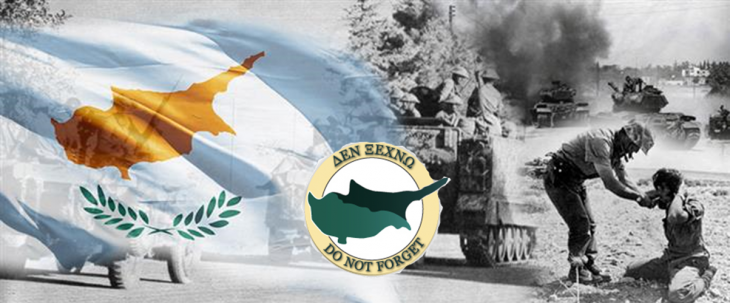CYPRUS MARKS SECOND WAVE OF 1974 INVASION

Forty-four years ago to this day the Turkish military launched its second offensive against the Republic of Cyprus, in full violation of international law, including the UN Charter, despite the ceasefire that had been agreed.
The Turkish army invaded Cyprus on July 20, 1974, and launched the second phase of the invasion on August 14 of the same year, occupying the best part of Mesaoria, Famagusta, Karpasia and Morphou.
Christos Karaolis, the President of the National Federation of Cypriots in the UK on Sunday gave a speech at St John the Baptist Greek Orthodox Church, Wightman Road. As the London Cypriot community comes together, with events like these, honouring the tragic chapter of Cypriot history.
He was formally invited to AKEL in Britain annual memorial service condemning the EOKA B Junta attempt to overthrow the Cyprus Government and the Turkish invasion of Cyprus in 1974 and in memory of those who lost their lives during this period.
The Turkish side continues to disregard calls by the international community relating to Cyprus and continues to hold the city of Famagusta hostage of its illegal military occupation. Dubbed a “ghost town”, Famagusta’s fenced off section – called Varosi – remains to this day deserted, abandoned to the elements.
Turkish troops invaded Cyprus on July 20, 1974, five days after the legal government of the late Archbishop Makarios III was toppled by a military coup, engineered by the military junta then ruling Greece. Two unproductive conferences in Geneva followed; the first between Britain, Greece and Turkey and the second with the additional attendance of Greek Cypriot and Turkish Cypriot representatives. Three weeks after the ceasefire of July 22, and despite the fact that talks were still being held and just as an agreement seemed about to be reached, the Turkish army mounted a second full-scale offensive. As a result, Turkey increased its hold to include the booming tourist resort of Famagusta in the east and the rich citrus-growing area of Morphou in the west.
All in all, almost 37% of the territory of the Republic of Cyprus came under Turkish military occupation. Nearly one-third of the population, some 200,000 Greek Cypriots, were forcibly uprooted from their homes and properties, thousands were killed during the hostilities, over 1,000 persons were listed as missing while thousands of Greek Cypriots and Maronites remained enclaved.
Numerous UN resolutions have demanded respect to the independence, unity and territorial integrity of Cyprus, the return of the displaced to their homes, and the withdrawal of foreign troops from the island, but all resolutions have been ignored by Turkey.
The latest effort to reach a Cyprus settlement was concluded last summer in the Swiss resort of Crans-Montana without result. Cyprus since then, President Nicos Anastasiades repeatedly said that he is ready to return to the negotiating table if Turkey accepts the termination of guarantees and intervention rights and is ready to withdraw its troops from the island.
Article written by London Greek Radio

